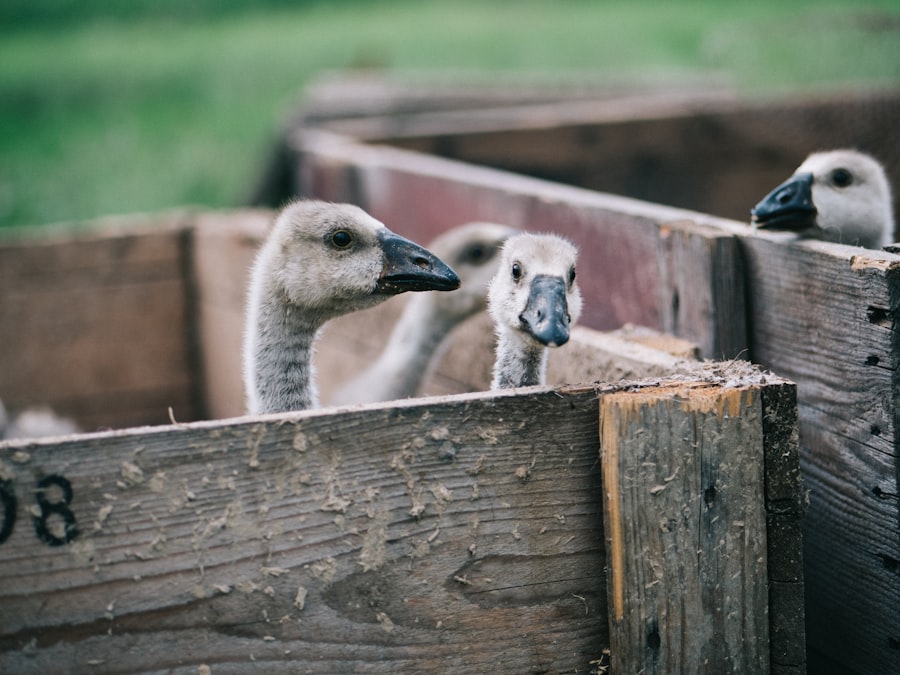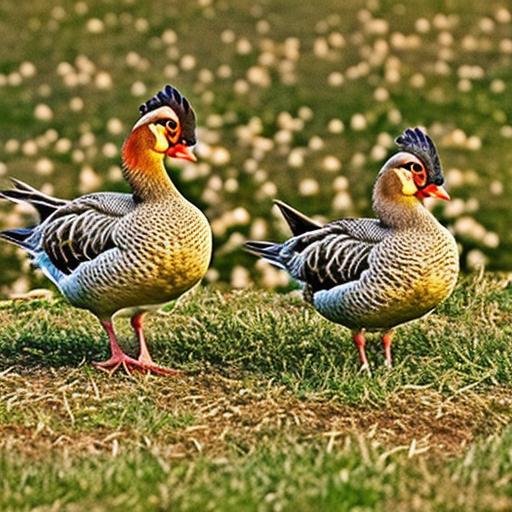Using geese as guardians for chickens is a unique and effective way to protect your flock. Geese are known for their strong protective instincts and their ability to ward off potential predators. They are highly alert and will sound the alarm if they sense any danger approaching. Geese are also excellent at herding and can keep the chickens together, preventing them from straying too far from the safety of the coop. In addition to their protective abilities, geese can also serve as natural pest control, keeping the area around the chicken coop free from unwanted pests.
Key Takeaways
- Geese can be effective guardians for chickens, as they are territorial and will alert to potential predators.
- Advantages of using geese include their ability to deter predators, their low maintenance needs, and their ability to provide natural pest control.
- When choosing a breed of geese, consider their temperament, size, and ability to adapt to your climate.
- Training geese to protect chickens involves introducing them to the flock gradually and rewarding them for exhibiting protective behavior.
- Housing requirements for geese and chickens include providing adequate space, shelter, and access to water and food.
- Feeding and care of geese and chickens involves providing a balanced diet and monitoring for any health issues.
- Common challenges when keeping geese include their loud honking, potential aggression towards humans, and their tendency to wander.
- Integrating geese and chickens in the same space requires careful observation and management to ensure the safety of both species.
- Using geese as a natural pest control involves allowing them to graze in areas where insects and weeds are present.
- Keeping geese for chicken protection can be a rewarding and effective way to protect your flock, but requires careful consideration and management.
Advantages of using geese as guardians for chickens
There are several advantages to using geese as guardians for chickens compared to other animals or methods. One of the main advantages is their natural protective instincts. Geese are highly territorial and will not hesitate to defend their flock against any potential threats. They have excellent eyesight and hearing, making them highly alert to any signs of danger. Their loud honking can serve as a warning signal to both the chickens and the farmer, alerting them to the presence of predators.
Another advantage of using geese is their herding ability. Geese are natural herders and will keep the chickens together, preventing them from straying too far from the safety of the coop. This can be especially beneficial if you have free-range chickens that have access to a larger area. The geese will ensure that the chickens stay within a certain boundary, reducing the risk of them wandering off and becoming vulnerable to predators.
Choosing the right breed of geese for your flock
When choosing a breed of geese to guard your chickens, it’s important to consider their characteristics and temperament. There are several different breeds of geese, each with its own unique traits.
One popular breed for guarding chickens is the Toulouse goose. Toulouse geese are known for their calm and docile nature, making them a good choice for families with children or other animals. They are also large and strong, which can be intimidating to potential predators. Toulouse geese are excellent foragers and can help keep the area around the chicken coop free from pests.
Another breed to consider is the African goose. African geese are highly alert and have a strong protective instinct. They are known for their loud honking, which can serve as a warning signal to both the chickens and the farmer. African geese are also good foragers and can help control pests in and around the chicken coop.
Training geese to protect chickens
Training geese to protect chickens requires patience and consistency. It’s important to start training them from a young age, as they will be more receptive to learning. One effective method is to use positive reinforcement, such as treats or praise, when the geese exhibit protective behavior towards the chickens.
It’s also important to socialize the geese with the chickens from an early age. This can be done by allowing them to interact in a controlled environment, such as a fenced area. This will help the geese become familiar with the chickens and develop a bond with them.
Consistency is key when training geese. It’s important to establish clear boundaries and reinforce them consistently. For example, if you want the geese to stay within a certain area, use fencing or other barriers to define that boundary and consistently reinforce it.
Housing requirements for geese and chickens
Geese and chickens have different housing requirements, but it is possible to provide suitable accommodations for both species in the same space. Geese require a larger area than chickens, as they need room to roam and graze. A fenced-in yard or pasture is ideal for geese, as it allows them to forage for food and exercise.
For chickens, a secure coop is essential to protect them from predators. The coop should be well-ventilated and provide enough space for the chickens to roost and lay eggs. It should also have a secure door that can be closed at night to keep the chickens safe from nocturnal predators.
To accommodate both geese and chickens in the same space, you can provide a separate area within the larger yard or pasture for the chickens to roost and lay eggs. This can be done by using fencing or other barriers to create a designated area for the chickens. The geese can then have free access to the rest of the yard or pasture.
Feeding and care of geese and chickens

Geese and chickens have different dietary needs, but it is possible to provide them with suitable food and care. Geese are grazers and require access to fresh grass and other vegetation. They also need access to clean water for drinking and bathing. In addition to grazing, geese can be fed a commercial waterfowl feed or a mix of grains and vegetables.
Chickens, on the other hand, require a balanced diet that includes a mix of grains, protein, and calcium. They can be fed a commercial chicken feed or a mix of grains, vegetables, and protein sources such as mealworms or insects.
It’s important to provide both geese and chickens with fresh water at all times. Geese enjoy bathing in water, so it’s important to provide them with a shallow pool or pond where they can swim and clean themselves.
Common challenges when keeping geese to guard chickens
Keeping geese to guard chickens can come with its own set of challenges. One common challenge is aggression towards humans or other animals. Geese can be territorial and may become aggressive if they feel threatened. It’s important to establish yourself as the dominant figure in their flock and set clear boundaries from the beginning.
Another challenge is noise. Geese are known for their loud honking, which can be disruptive to neighbors or other animals. If noise is a concern, it’s important to consider the proximity of your neighbors and take steps to minimize the noise, such as providing a designated area for the geese away from residential areas.
Integrating geese and chickens in the same space
Integrating geese and chickens in the same space requires careful planning and gradual introductions. It’s important to introduce the geese to the chickens slowly and in a controlled environment. This can be done by using a temporary fence or barrier to separate them initially, allowing them to see and hear each other without direct contact.
Over time, you can gradually remove the barrier and allow supervised interactions between the geese and chickens. It’s important to monitor their behavior closely during these interactions and intervene if any aggression or bullying occurs.
Using geese as a natural pest control for your flock
One of the benefits of using geese as guardians for chickens is their ability to serve as natural pest control. Geese are excellent foragers and will eat a variety of pests, including insects, slugs, and snails. They can help keep the area around the chicken coop free from unwanted pests, reducing the risk of disease or infestation.
Using geese as natural pest control is also more environmentally friendly than using chemical pest control methods. Geese do not require any chemicals or pesticides to do their job, making them a safe and sustainable option for pest control.
Conclusion and final thoughts on keeping geese for chicken protection
In conclusion, using geese as guardians for chickens can be a highly effective way to protect your flock. Geese have strong protective instincts and are excellent at herding, keeping the chickens together and warding off potential predators. They can also serve as natural pest control, keeping the area around the chicken coop free from unwanted pests.
When choosing a breed of geese for chicken protection, it’s important to consider their characteristics and temperament. Training geese to protect chickens requires patience and consistency, and it’s important to socialize them with the chickens from an early age.
Providing suitable housing, feeding, and care for both geese and chickens is essential for their health and well-being. Integrating geese and chickens in the same space requires careful planning and gradual introductions. Using geese as natural pest control is a sustainable and environmentally friendly option for keeping your flock healthy and happy.
Overall, adding geese to your flock can provide added protection and pest control, making them a valuable asset to any chicken owner.
If you’re looking for ways to protect your chickens from predators, you might want to consider keeping geese as guardians. Geese are known for their loud honking and aggressive nature, which can deter potential threats to your flock. In fact, studies have shown that geese can be more effective than dogs in guarding chickens. To learn more about the benefits of keeping geese as guardians, check out this informative article on Poultry Wizard: Geese as Chicken Guards.
FAQs
What is the purpose of keeping geese to guard chickens?
The purpose of keeping geese to guard chickens is to protect the chickens from predators such as foxes, raccoons, and coyotes. Geese are known to be territorial and will alert the chickens of any potential danger.
What breeds of geese are best for guarding chickens?
Breeds of geese that are known to be good at guarding chickens include Toulouse, Embden, and African geese. These breeds are large and have a strong protective instinct.
How many geese should be kept with a flock of chickens?
The number of geese that should be kept with a flock of chickens depends on the size of the flock and the size of the area they are in. As a general rule, one goose per 10-20 chickens is recommended.
Do geese require special care?
Geese require basic care such as access to clean water, food, and shelter. They also need regular grooming and protection from predators. However, they do not require any special care beyond what is necessary for other poultry.
Can geese be aggressive towards humans?
Geese can be aggressive towards humans if they feel threatened or if they are protecting their territory. However, with proper handling and socialization, geese can be friendly and docile towards humans.
What are the benefits of keeping geese to guard chickens?
The benefits of keeping geese to guard chickens include increased protection from predators, reduced stress on the chickens, and a more natural and sustainable approach to poultry farming. Additionally, geese can provide eggs and meat for consumption.
Meet Walter, the feathered-friend fanatic of Florida! Nestled in the sunshine state, Walter struts through life with his feathered companions, clucking his way to happiness. With a coop that’s fancier than a five-star hotel, he’s the Don Juan of the chicken world. When he’s not teaching his hens to do the cha-cha, you’ll find him in a heated debate with his prized rooster, Sir Clucks-a-Lot. Walter’s poultry passion is no yolk; he’s the sunny-side-up guy you never knew you needed in your flock of friends!








I have a flock of 10 hens, 1 rooster, and 1 white Chinese goose. They were all purchased from the same hatchery at the same time and were raised together. The goose was not sexed; it was just randomly added to the mix. They are 5 months old and have been living together wonderfully until today. Evidently, the goose turned out to be a male as he grabbed one of the chickens in the middle of the back and trying to pin her down. He would not release the hen until I picked him up and held him. What should I do to prevent him from injuring my hens? Is this just a temporary hormone rush or will he continue this behavior and I need to separate them permanently?
It sounds like you’ve got quite the diverse little flock! It’s not uncommon for male geese, especially as they reach sexual maturity (around 5-6 months), to exhibit dominant or mating behaviors, even towards other species like chickens. This behavior is driven by hormones and natural instincts, but it can indeed pose a problem for your hens if it continues.
What you’re witnessing is likely a combination of a hormone surge and confusion. Without a female goose around, your gander is trying to assert dominance or satisfy his instincts with the next closest thing in his environment – your hens. Unfortunately, this behavior may not resolve on its own and could result in injuries to your chickens, especially since a goose is much stronger and heavier than a hen.
To prevent injuries, it’s best to separate the goose from your hens. If you have space, consider creating a separate enclosure for him, ideally with access to his own shelter and a water source. If you’re open to it, introducing a female goose (or two!) could help redirect his attention. Geese are social animals and thrive with companions of their own kind.
While separating them may feel like a hassle, it’s the safest option for your hens. Keeping a mixed flock is wonderful, but some species-specific behaviors, especially those tied to reproduction or dominance, can make things tricky. Keep an eye on your goose to ensure he’s not stressed or lonely if separated, and hopefully, this adjustment will bring peace back to your barnyard!